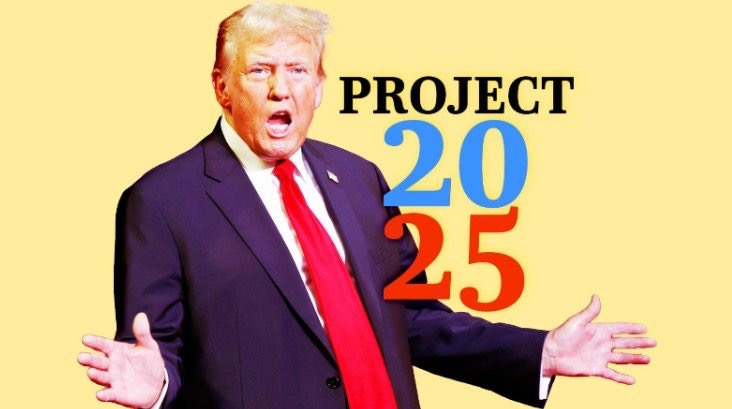During the 2024 Presidential Election, a doctrine known as ‘Project 2025’ implicitly became the unofficial policy platform of the Republican campaign. Although the Republican candidate, and now President-Elect, Donald Trump, denied any knowledge of Project 2025, it represents a sharp turn toward governance rooted in hard-right conservative principles, mirroring many positions often taken by Trump himself.
Project 2025 is a political playbook written by various conservative leaning organizations whose purposes are to promote conservative public policies, the main publishing organization being an American think tank called The Heritage Foundation. The doctrine argues that the actions of liberal policies have damaged the country, and they propose sweeping changes to rebuild it based on conservative ideals. The proposals touch on a wide array of topics related to policy and governance, specifically targeting education, climate-change, women’s reproductive rights, and LGBTQ+ rights. Yet many of these topics, seemingly distant, could have implications for high school students.
One of the most significant areas of reform is education. Project 2025 aims to reduce federal involvement—on par with most conservative beliefs—ultimately aiming to eliminate the Department of Education. The plan advocates for giving families more control over how children are educated by shifting the power to state and local levels. However, this decentralization would come at the cost of programs such as Title 1, which funds high-poverty schools, and Head Start, which supports millions of children with food security.

Beyond education, the project also outlines major shifts in climate policy. It aims to ensure affordable and abundant energy for all Americans by loosening environmental restrictions. This includes withdrawing from the Paris Agreement, which according to the United Nations, is a treaty that compels all countries to reduce their emissions and collaborate in order to adjust to the impacts of climate changes. The retraction of the United States from a step previously taken by the Trump Administration in 2020. While proponents argue this will stimulate economic growth and energy independence, critics warn of severe environmental consequences. Climate change is no longer a distant threat. Rising sea levels, intense storms, and extreme heat waves are already impacting communities worldwide. These changes can lead to increased costs for housing, food, energy, and healthcare. For a child born today, the estimated lifetime cost of climate change could reach a substantial $500,000. As the U.S. considers its role in global climate efforts, it must weigh the potential economic benefits against the long-term environmental and societal costs.
Project 2025 advocates for a redefinition of abortion, excluding it from the realm of healthcare. It proposes deconstructing the HHS Reproductive Healthcare Access Task Force, a federal authority that “coordinates efforts across the Federal government to protect access to reproductive healthcare services.” This task force works to eliminate barriers to care, promote evidence-based practices, and ensure equitable access for all individuals.
In its place, Project 2025 plans to establish a pro-life task force that would prioritize policies supporting both women and their unborn children. The project further aims to revoke the approval of mifepristone, a widely used medication for abortion. While states retain authority over abortion legality, federal regulations governing drug distribution, including mail-order sales, can significantly impact access. The Trump Administration’s proposal introduces a singular point of contact for Domestic Women’s Health, tasked with overseeing the development of federal policies aligned with pro-life principles and family values.
Furthermore, those who oppose Project 2025, including reproductive rights organizations like Planned Parenthood and the ACLU, argue that restricting abortion access is a violation of women’s fundamental human rights and could lead to severe health consequences, including death, ironically undermining the primary goal of protecting life.

Project 2025 seeks to redefine gender identity and family structure, aiming to deny the existence of transgender individuals and restrict the rights of same-sex couples. By focusing on the traditional nuclear family model, the project proposes to limit LGBTQ+ rights and services. According to its charter, it calls for a shift in policy to prioritize the “formation of stable, married, nuclear families” and protect adoption and foster care services that discriminate against LGBTQ+ couples. The project itself states that children should be raised by their “biological” fathers and mothers because the “male-female dyad is essential to human nature.”
Additionally, the project declares that “Pornography, manifested today in the omnipresent propagation of transgender ideology and sexualization of children…” is a scourge on society. And it calls for the outright ban of transgender ideology in all forms. Critics of Project 2025 argue that its proposed policies would discriminate against LGBTQ+ individuals and limit their rights. They contend that the project’s focus on traditional family structures is outdated and harmful, and that it would negatively impact the lives of many people.
Project 2025 proposes many changes in policy direction, aligning with conservative principles of governance, policy, and beliefs. While it remains uncertain how many of its proposals will be adopted by the new administration, it’s crucial to stay informed and engaged in the political process to understand the potential impact these policies could have on individuals and society as a whole.


